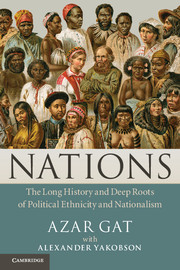Book contents
- Frontmatter
- Contents
- Acknowledgments
- 1 Introduction: is nationalism recent and superficial?
- 2 The evolution of kin–culture communities
- 3 From tribes to statehood
- 4 Premodern ethne, peoples, states, and nations around the world
- 5 Premodern Europe and the national state
- 6 Modernity: nationalism released, transformed, and enhanced
- 7 State, national identity, ethnicity: normative and constitutional aspects
- Conclusion
- Notes
- Index
5 - Premodern Europe and the national state
Published online by Cambridge University Press: 05 February 2013
- Frontmatter
- Contents
- Acknowledgments
- 1 Introduction: is nationalism recent and superficial?
- 2 The evolution of kin–culture communities
- 3 From tribes to statehood
- 4 Premodern ethne, peoples, states, and nations around the world
- 5 Premodern Europe and the national state
- 6 Modernity: nationalism released, transformed, and enhanced
- 7 State, national identity, ethnicity: normative and constitutional aspects
- Conclusion
- Notes
- Index
Summary
Europe dominates the study of nations and nationalism, being regarded as the exclusive hotbed of the national state. Modernists and the majority of traditionalists agree about this, even as they differ on when European national states emerged, whether it was only with the French and Industrial revolutions, or during early modern times, or the Middle Ages. As we have seen, this view of Europe’s uniqueness is fundamentally untrue. National states have existed around the world for millennia, indeed, their emergence was everywhere closely intertwined with the emergence of the state itself as one of its forms. Thus, Asia (and adjacent Egypt), where states evolved the earliest, is also where some of the most ancient national states can be found. This reality is blurred by the fact that in southwest Asia in particular (but not in east Asia), the national state template of political organization was destroyed and supplanted by the imperial template from Assyrian times. Europe’s uniqueness, while existing, was somewhat different than is usually construed. Failure to realize where the European experience was unique and where it was not has created misperceptions that have bent and distorted the scholarly discussion of the national phenomenon.
- Type
- Chapter
- Information
- NationsThe Long History and Deep Roots of Political Ethnicity and Nationalism, pp. 132 - 243Publisher: Cambridge University PressPrint publication year: 2012



